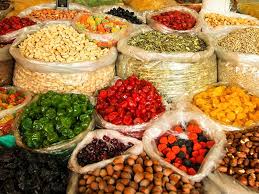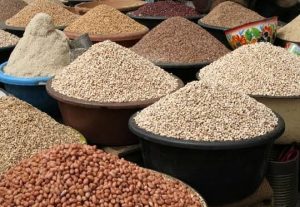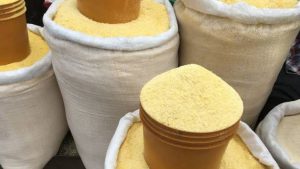Food Insecurity in Uyo Markets: Rising Prices Threaten Residents’ Living Standards
By Mercy Obot

Despite the social register programme initiated by the administration of Governor Umo Eno to tackle food insecurity in Akwa Ibom State, the prices of foodstuffs, including local produce, keep increasing in Uyo markets daily, threatening residents’ living standards.
A lady in her early fifties who owns a local restaurant in the state capital is on the verge of closing her business as local marketers in Uyo, Akwa Ibom State, hike the prices of foodstuffs to unbearable rates.
Imaobong revealed to this reporter that food items in the market have tripled, and it is having a ripple effect on her business. As a result of this, she is barely surviving.


She narrated that most businesswomen have folded up their businesses due to the unprecedented surge in the prices of food items in the state.
This is an instance of two elderly women who came to purchase food items at Itam Market to sell. Still, unfortunately, their expectations were cut short due to the high cost of the commodity, and they tearfully returned home.
Related: Gov Eno Recommends Return to Farming as Part of Solutions To High Cost of Food
In her words, “I don’t know how we will survive as food vendors because food items keep increasing daily, and this is having negative effects on my business, and others are also suffering from the same ordeal.
“The most painful thing is that this local produce is now expensive due to the greediness of local marketers in the state. They blame the high cost of food items on dollar rates, but we know that this is not caused by either the federal government or the dollar; this is all their fault.”


In his assertion, Eddy blamed the trade unions for the upsurge in prices of local produce in the state.
“There is a water leaf association, a union of vegetables, a union for Affang leaf dealers, and the list goes on, and the leaders of each of these associations will have meetings with their members to decide the prices that they will end up inflicting on the indigenes.
“Unfortunately, there is little or nothing the state government can do because these unions have been politicised,” he said.
On the contrary, Alice, who plants cucumber, sweet corn and okra, actually blames the high cost of food items in Uyo markets on drought and the high cost of gasoline.
She said that people are ignorant of the traumatising experiences farmers go through to grow their crops, especially when they have to deal with natural disasters.
Read Also: Gov Eno Meets Traders, Market Associations Over Food Subsidy Implementation
“Throughout March, we as farmers experienced drought because of less rain, and even in April, there was no rain for two weeks, and this is gradually affecting the growth of crops on the farm.
“As a farmer who plants sweet corn, cucumber and okra, to cope with such a devastating situation of less rain on my farm, I have to water my crops both morning and evening, and this is made possible by using a pumping machine.
“This strategy is eating deep into my income because of the high cost of fuel to pump water into my farm. If I hadn’t done this, I would have lost my crops a long time ago.
“And due to the drought, the Okro seeds I bought for N25,000 in January are now sold for N68,000. This development explains the high cost of Okro on the market.
“Therefore, this drought situation and high cost of fuel have prompted an increase in food prices in Uyo markets, and there are farmers who have lost their crops due to lack of rain, and this is so devastating,” she lamented.
In an interview session, consumers revealed how the high cost of food has impacted their well-being negatively and also their families.
Narrating her plight, Ekaette, an aged woman in her sixties, disclosed how traumatising it is to go to buy goods in Anua Market in Uyo.
In her words, “I am so scared to purchase food items now in Anua Market because it ends up increasing my blood pressure.
“Purchasing goods recently is both financially and emotionally draining, and this is the reason I had to entrust my children with such responsibility.”
A mother of three, Mary, also revealed how expensive food items are in the Use-Offot Market in Uyo. She noted that her children have doubled their eating habits, especially her male children, making life a bit hard.
“My male children are on holiday, and their rates of eating have doubled; they end up eating like four or five times a day, and it is causing a toil on my flesh.
“The prices of food items in Use Offot Market are so expensive, it takes the grace of God to see the next meal,” she decried.
Another consumer spoke about her experience in Akpan Andem Market in the state capital, describing the situation as traumatising.
According to Glory, “Today, I had to spend hours getting an affordable price for cow meat; the price of this particular good is on the high side.
“I can no longer buy red meat for five hundred Naira, and even meat worth N1,000 is a few pieces, and this experience is threatening my mental health. How will I cope with such an economy?”
To Esther, the cost of fish is also high. “I was able to buy fish at the rates of two hundred and fifty nairas or three hundred nairas because my mom is diabetic, but now the smallest fish is sold for five hundred or six hundred upward, and this is not fair; this is draining us financially as a family,” she said.
Okon narrated his ordeal with cassava flakes (Garri). He said, “Five cups of garri are worth one thousand naira (N1000), and this means a cup is two hundred naira each. This is so frustrating because only big men can now afford this necessary food item.”
According to Mercy, fufu (pounded cassava) is another expensive item to purchase in the market.
“I barely finished one wrap of fufu that was N100, but now I need like three wraps to be satisfied, and this is worth N300. I truly don’t know how the coming days will be, but God is in control,” she lamented.




